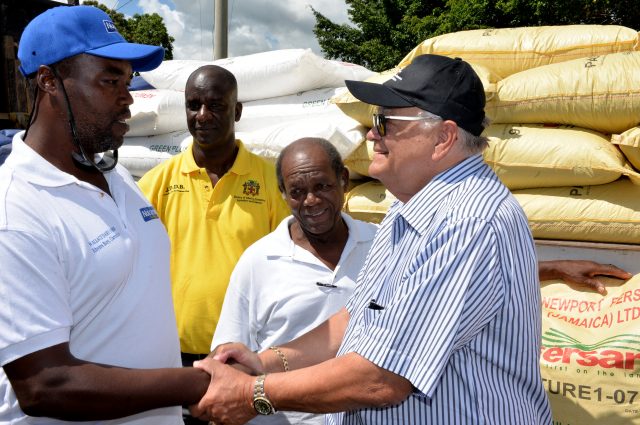Farmers Urged to Practise Integrated Pest Management to Control BAW
The Rural Agricultural Development Authority (RADA) is encouraging farmers to practise integrated pest management (IPM) to control the outbreak of the Beet Army Worm (BAW).
The IPM method takes into consideration environmental factors that affect the BAW and its ability to thrive, which means that the farmers can create conditions that are unfavourable for the pest, while minimising the risks to people and the environment.
Senior Director, Division of Training, Technology and Technical Information at RADA, Winston Shaw, said farmers have a huge responsibility to stop the spread of the BAW.
“We are encouraging farmers to work with the agency to get the most recommended IPM techniques as well as work with other senior and seasoned farmers who have had the requisite training from RADA,” he said.
“No one set of persons can manage the BAW; it’s a collaborative effort among the Agriculture Ministry, RADA, farmers and the community,” Mr. Shaw added.
He also noted that the control of the BAW is the application of several different methods, including chemical application, field sanitation and proper disposal of waste crops.
Mr. Shaw said the most effective and long-term way to manage pests is by using a combination of IPM methods.
“Farmers need to manage their fields properly… and this includes monitoring. In monitoring, we recommend that farmers scout the field at least twice per week, looking specifically for any sign of the BAW, such as sacks, young worms or the adult bats,” he explained.
Mr. Shaw said this will allow farmers to identify signs of infestation from early and apply quick preventative methods.
He pointed out that scouting and monitoring of the fields are inexpensive methods that should be utilised, because this will save the farmers thousands of dollars in the long run.
He added that the pheromone trap is a good monitoring tool that is fairly inexpensive.
Mr. Shaw is recommending that farmers practise good field sanitation. “Farmers need to keep their field clean and free of weeds, rubbish and anything that the insect can hide under and thrive,” he advised.
He noted that land preparation is also a recommended way of controlling or preventing the outbreak.
“What this land preparation does in assisting the control of the BAW, is that it exposes the pupa of the BAW when the land is tilled, and this exposes the pest and allows birds to eat them. The land preparation also exposes the pest in its cocoon to the elements, such as rain, which helps to remove them out of the field,” Mr. Shaw said.
The Senior Director said farmers should choose the right chemical and apply it in the correct manner.
“RADA and the Ministry hold intense training sessions with the farmers to point out to them the approved chemicals to use. We find that farmers may buy chemicals based on affordability and based on availability, but these chemicals are not always the approved ones to use to address the problem,” he pointed out.
Mr. Shaw said pesticides should only be used after monitoring indicates they are needed. Pest control materials are selected and applied in a manner that minimises risks to human health, beneficial and non-target organisms, and the environment.
“We are encouraging farmers to speak with local RADA representatives, so that you can be guided on the appropriate and effective substances to use,” he said.
“We are also encouraging farmers to attend the training sessions. Since 2015, RADA has established a weekly monitoring and periodic training session, especially in areas where there have been outbreaks,” Mr. Shaw said.
Article by: Peta Gay Rowe
Photo from: www.jis.gov.jm




